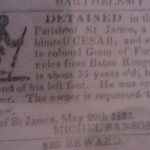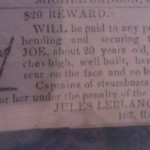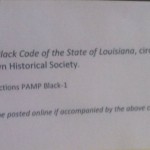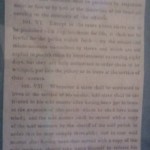Unforeseen Freedom
Brian P. Ballie
Here comes Richard and Josephine I haven’t seen them in quite some time and they are here together. This is truly weird for they have no reason to visit me today. They came wearing grim faces and portraying sad eyes. In my heart I know that something terrible has happened, I wonder if it has anything to do with the terrible ruckus down at the telegraph station today I swear it was like a complete mad house there. Then they start talking and I can barely believe what I am hearing. “Jessica my sister” she says “I there has been a terrible accident on the rail. It has been most disastrous and families have been thrown into turmoil.” “Death has come and we will get through this as best as we can because we are family and that’s what family does” she continued to speak but I had long stopped listening to her and came to the horrible realization that he was gone. DEAD for that is what he is dead and gone according to Robert. My poor Brently taken away from me in a disastrous culmination of steel and fire on that beast of iron he worked on. I am blinded by the grief for my eyes have been bathed in the wetness of my tears and I have nothing else but sorrow in my heart. I now weep for he whom I lost the man that I love.
In a fell swoop it is gone I feel nothing and need to be alone, my room beckons calling me into the peaceful abyss of my abode. Gone is the light for the sky has turned dark with rain as if somehow the gods feeling my sorrow wept with me and have become spent. The darkness that is there is dissipating slowly like the sobs wrecking through my body. In this moment I am truly lost but just as quickly clarity comes to me as the light starts peeking through more and more through the sky. I remember a time when I was happy and young and beautiful, a time when life was so simple. Then I realized that I was free to go back to being that girl. I was no longer tied down to the dead man I was “FREE” truly free and I am going to love it.
Ecstasy has set in and my heart is pounding my realization has thrown me for a loop and I have accepted that I am truly free. I no longer need to worry about pleasing the dead man I have only myself to worry about. Pure happiness has filled my once dreary heart I feel like new life has been breathed into me and it is intoxicating. I feel alive more so than I have felt in a long time. I can hear her out there shouting in riotous anger Josephine my sister asking me to come out and talking to Robert at my conversation but she doesn’t understand, neither does he. They can’t begin to understand the feelings shooting through my very soul.
I have come to a conclusion that I am better because of his death but at the same time I truly loved that man that wonderful kind man who sheltered me through the years where I was his. I will truly miss him and when I see all that is left of him I will weep again but for now I will relish in my freedom. Because even though he was my love, love was not present all the time and I am happy I am not burdened with loving him anymore. There she is again yelling “Open the door Jessica who are you talking to stop these rambling thoughts before you make yourself sick.” Sick what does she know she is no doctor she is a question bathed in mystery to me has been all my life.
I have had enough of her pleading and I care not for her talking. I open the door and in she rushes taking me by the hand and pulling me downstairs gently like I am made of glass and liable to break any time soon. I see Robert standing in the foyer looking expectantly at me as if I were there to present him with something. Then I hear it the jingling of the lock and the rattle of a key and in swings the door. Standing there is a ghost a ghost of my husband. I look again and see it’s not a ghost but the real thing. Gone is my freedom gone just as quickly as it came. I am no longer free. There is a pain a stabbing pain in my chest. They are all talking I can tell because their mouths are moving whether from shock I know not. All I hear is the clashing of a bell and the chains dragging me back in he’s alive and I am dead.
“She said it over and over under her breath: ‘free, free, free’” Freedom is one of the major themes in the short story entitled “The Story of An Hour” by Kate Chopin. This story is about a woman’s reaction to the supposed death of her husband. In the original version of this story the narrator is a 3rd person limited narrator. We only have access to some of the thoughts of Mrs. Mallard and what she says while in the room but even that is limited in what we get from it. In my retelling I change it to a first person narrator from the point of view of Mrs. Mallard. I however structured it in the form of an internal monologue. The reality is the narration change drastically changes what we understand about the characters.
The third person narration present in this piece plays a vital role in the development we see of the main character. From this point of view we get to know Mrs. Mallard in a small sense. Learning about her but always wanting more. The limited view of the narrator also takes away from the complete development of the story as we only have a sort of one sided disjointed view into some of what Mrs. Mallard is going through. It paints an image where we know nothing about the people around her.
In regards to the retelling of the same story from the point of view of a different narration style I took several factors into mind before making my decision. At first I thought of doing the story in the style of a third person omniscient narrator; thereby in fluxing a plethora of new information and ideas into the story. However I didn’t feel comfortable changing the story so drastically because in doing so I would have to literally create the bones for the other characters because what we know about them right now is minimal. Then I though how about first person narration from the point of view of Mr. Mallard would change the story. I realized however that there was no precedent for doing that because we know nothing of what happens during the time of the accident to when he comes home and keeping the story respectful to the original plot would lead to too many new ideas that could be conflicting. I finally decided to do a first person narration from the point of view of Mrs. Mallard in the form of a monologue. This I thought would give me enough to be able to tell it from her perspective talking about all those around her because we know what they were doing there but not what she was thinking when she found out about the death of her husband. Also we get to know her and see a lot about her life but not what bought on her thoughts about being free in this way I was able to create a mind for her and tell her feelings as close to what happened as possible. I was also able to tell what she was thinking when her sister comes to get her to leave the room and even what happened in her mind before she died.
The similarities in this story were vast they both followed the same plot line and had the same characters. The general story was essentially the same however that’s about where they stopped and the differences came into light. In the original story Mrs. Mallard is portrayed as a weak person through her sickness. She is seen as someone who can’t handle any sort of hardship in life due to a heart ailment. She at first is grief stricken when news of her husband’s death reaches her. She reacts like anyone who has lost someone dear to them would by breaking down into a tear sobbing mess. However slowly the grief turns to exuberance as she comes to feel happy about the death of Mr. Mallard. In the retelling Mrs. Mallard is seen as a strong willed woman who knows what she wants and is able to make major decisions about her life on her own. She feels grief but is able to quickly quell that and come to the realization that she has her freedom.
In the retelling Mrs. Mallard comes across as a strong and her sickness or lack of as it is not mentioned is almost a metaphor for her sister treating her differently all her life. In the original story we hear Josephine asking Mrs. Mallard to open the door but she doesn’t instead she says “I am not making myself ill” instead that she is “Drinking in a very elixir of life through the open window”. In the retelling we see into the mind of Mrs. Mallard who thinks to herself “There she is again yelling ‘Open the door Jessica who are you talking to stop these rambling thoughts before you make yourself sick.’ Sick what does she know she is no doctor she is a question bathed in mystery to me has been all my life.” Here we see drastically a change because we now know the type of person Mrs. Mallard. We see that she truly doesn’t understand her sister. Also in the retelling we have a true ending when it comes to the character of Mrs. Mallard we get to see her last thought before death in which she says “All I hear is the clashing of a bell and the chains dragging me back in he’s alive and I am dead.” In comparison to the original story where we get to know that she died of a heart ailment in the retelling she dies from the knowledge that she has lost her freedom.
In the end the change of the narrator had a drastic change on the story. In the original narration we have a view looking in on a woman’s reaction to the death of her husband and then finding out that it was indeed false. In this format we get to see the softer side of the woman who loved her husband but also loved her freedom. In the retelling we have a woman’s view of what happens when she finds out about the death of her husband we get to see her intimate thoughts as she is having an internalized dialogue talking about her feelings as well as her reaction to finding out that the death notice was false. Here she is smart and straightforward person she is soft and hard at the same time in that she quickly comes to the decision that her freedom is amazing and she would much rather be free than married to her husband and thus she dies from the shock of losing the gained freedom.









